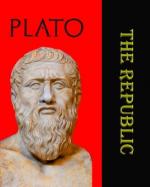|
This section contains 3,586 words (approx. 12 pages at 300 words per page) |

|
SOURCE: Cooke, Elizabeth F. “The Moral and Intellectual Development of the Philosopher in Plato's Republic.” Ancient Philosophy 19, no. 1 (spring 1999): 37-44.
In the following essay, Cooke comments on Plato's view of the role of philosophy in everyday life, stating that for Plato, philosophy is not an abstract concept, but one that draws from all aspects of life, including the spiritual, moral, and intellectual.
The metaphysical knowledge required for the philosopher is often seen as merely abstract and theoretical, though the philosophers share in the same early character education as that of the spirited auxiliaries. This is not a mere oversight by Plato. In the Republic Plato requires that the philosopher be spirited and that the spiritedness be trained properly with the auxiliaries. Only after such training and the achievement of the character virtues can the philosopher go on to training in dialectic, mathematics, and politics. But what is the...
|
This section contains 3,586 words (approx. 12 pages at 300 words per page) |

|


